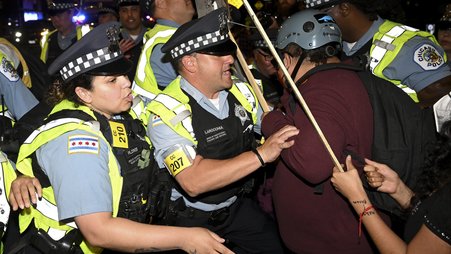
Do not enter! Access to the Google antitrust trial in federal district court in Washington, D.C., pictured above, has been severely restricted. Thanks to the efforts of journalists and news outlets, that’s starting to change. Washington DC - USA - panoramio (10) by Paulo JC Nogueira is licensed under CC BY-SA 3.0 DEED.
On Monday, Google CEO Sundar Pichai testified as the star defense witness in the landmark antitrust trial against his company. And surprisingly — for this trial, at least — the public could actually watch his testimony.
That shouldn’t be unusual. American trials are supposed to be open to the public. The Google antitrust trial, however, has been marred by an unusual level of secrecy.
But now, eight weeks into this historic trial, it appears that the parties and the court may have finally learned some lessons about transparency. Better late than never — and thanks to the work of journalists and news outlets — public access to trial testimony, exhibits, and transcripts in the Google antitrust trial is improving.
Top secret testimony
One of journalists’ main complaints at the beginning of the trial was the amount of secret witness testimony. By mid-October, for example, witnesses testified at least partially in secret on seven days of the trial. At one point, “the Court excluded the public from the courtroom for the entire day,” according to a legal motion filed by The New York Times and other news outlets.
The media coalition also complained that the court wasn’t giving the press and the public enough notice of courtroom closures and the chance to object.
In response to the motion, Judge Amit Mehta instituted a new procedure that requires the parties to notify the court the night before if they believe testimony will need to be given in secret the next day. If the court gets such a notice, it will notify the public on the trial docket and hear objections to sealing in the morning.
Since then, there’s been just one notice posted on the public docket that sealed testimony is expected. It could be a coincidence — or it could be that requiring the parties to actually think about whether secrecy is needed and to announce plans for secret testimony in advance successfully discourages unnecessary sealing of witnesses’ testimony.
Undisclosed exhibits
The lack of access to trial exhibits has also frustrated journalists. While the government initially posted some of the exhibits online, it stopped after Mehta chastised it. Then, with Mehta’s approval, the government began posting exhibits again, but only selectively and sporadically.
Enter the media coalition again. Its motion asked Mehta to require all the parties to give the public access to trial exhibits in full and to make them available as soon as possible after they’re used in court.
In response, Mehta created another new process going forward that lets the press request exhibits from the parties, to be provided within two to four business days, depending on whether they contain any confidential information. Mehta’s order also set deadlines for the parties to provide copies of exhibits previously used and not yet available to the public.
Still, some transparency issues with exhibits persist. For example, attorney Megan Gray, who has been closely watching the trial, told me that some of the exhibits Pichai reviewed while on the stand weren’t shown to the public during his testimony, and it's not clear if the exhibits will be redacted when they’re entered into evidence.
Out-of-reach transcripts
In the absence of any video or audio livestream of the trial, journalists who couldn’t attend in public were left to rely on the written transcripts to understand what happened each day. But daily transcripts are incredibly expensive. One courtwatcher estimated that transcript costs would be “in the tens of thousands of dollars” by the end of the trial. That puts them out of reach for many journalists and members of the public who want to follow the trial.
Early in the trial, some journalists and observers considered the possibility of sharing transcripts or even posting them publicly but were hesitant due to vague rumors that they were somehow prohibited from posting them online. (When I called the court reporter’s supervisor’s office, the person who answered the phone wasn’t able to tell me whether any rule prohibited the posting of trial transcripts online.)
Now, in a victory for transparency, the investigative news outlet The Capitol Forum has begun posting the daily trial transcripts on its website. Teddy Downey, executive editor, told me the outlet began posting the transcripts to increase public knowledge about the trial. “The media can’t be there all the time, and ordinary citizens can’t reasonably be expected to attend,” Downey said. “This was the only way we could ensure there was broad public access to the trial proceedings.”
The transcripts provide a wealth of information for reporters or others who want to follow the day-by-day developments but can’t be in the courtroom in person. While a livestream of the trial would be better (and there’s no reason for court rules that forbid it), access to daily transcripts is the next best thing.
Fight for your right of access
These changes have significantly increased public access to the Google antitrust trial. But they probably never would have happened without public pressure on the court and legal filings demanding greater access.
As this case shows, the public and the press’s right of access to our justice system can’t be taken for granted. When courtroom doors are closed, journalists and news outlets must push them back open.



